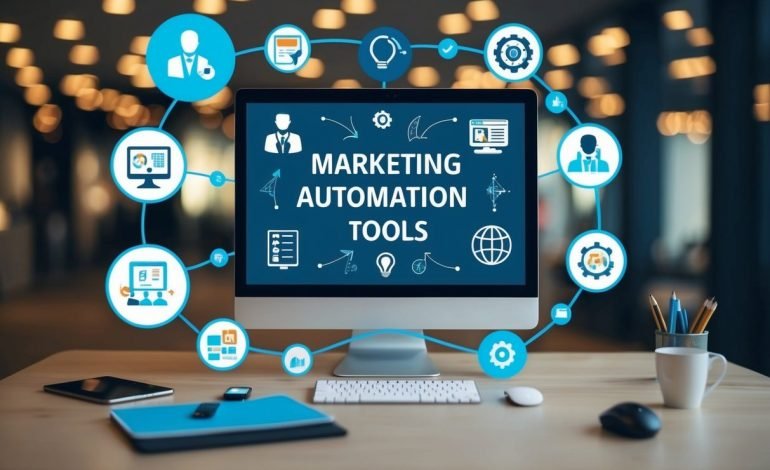Marketing Automation Tools: Essential Solutions for Streamlining Your Campaigns

Marketing automation tools are becoming essential for businesses looking to enhance their efficiency and streamline their marketing efforts. These tools enable companies to automate repetitive tasks, optimize campaigns, and analyze performance metrics in real time. Integrating marketing automation can significantly boost productivity and improve the overall effectiveness of marketing strategies.

With a plethora of options available, selecting the right marketing automation tool can be daunting. Factors such as business size, budget, and specific marketing goals play key roles in this decision-making process. Organizations that leverage these tools can expect not only to save time but also to deliver personalized experiences to their customers.
As businesses strive to remain competitive, marketing automation tools offer solutions that can help them connect more effectively with their target audience. By understanding how these tools function and the benefits they provide, companies can position themselves for growth and increased ROI.
Understanding Marketing Automation
Marketing automation encompasses tools and strategies that enhance marketing efforts through automated processes. This approach streamlines repetitive tasks, allowing marketers to focus on higher-level strategies.
Definition & Core Components
Marketing automation refers to software designed to automate marketing activities. These activities include email marketing, social media posting, and ad campaigns.
Core components of marketing automation typically include:
- Lead generation: Tools that capture potential customers’ information.
- Campaign management: Systems that plan and execute marketing campaigns efficiently.
- Analytics: Features that track and evaluate campaign performance.
Together, these components enable marketers to create highly targeted campaigns that engage audiences effectively.
Benefits of Marketing Automation
The benefits of marketing automation are significant.
It increases efficiency by automating repetitive tasks, which saves time.
- Personalization: It allows for tailored messaging based on customer data, enhancing engagement.
- Improved ROI: Organizations often see an increase in lead conversions and sales through targeted campaigns.
- Scalability: Automated systems can handle growing customer bases without a proportional increase in marketing resources.
Incorporating marketing automation can lead to more strategic decision-making driven by data insights.
Key Features of Marketing Automation Tools
Marketing automation tools offer various features that enhance efficiency and streamline marketing efforts. Key capabilities include managing email campaigns, nurturing leads, and providing detailed analytics to guide decision-making.
Email Campaign Management
Email campaign management is a fundamental feature that allows users to design, schedule, and send targeted email communications. Users can create segmented lists based on customer behavior, demographics, or preferences.
Personalization options, such as dynamic fields, enhance engagement by tailoring messages to individual recipients. Automation enables drip campaigns, ensuring timely follow-ups that nurture leads through the sales funnel.
Most tools include A/B testing capabilities to compare different versions of emails, optimizing performance. Analytics provide insights into open rates, click-through rates, and conversions, allowing marketers to refine strategies effectively.
Lead Nurturing and Scoring
Lead nurturing is essential for maintaining engagement throughout the buyer’s journey. Marketing automation tools facilitate this process by sending targeted content to leads based on their interactions.
Lead scoring assigns numerical values to leads based on behavior, such as website visits or email opens. This scoring helps prioritize leads, focusing efforts on those more likely to convert.
Automated workflows trigger actions based on specific criteria, such as sending a follow-up email after a lead downloads a resource. Such processes reinforce the relationship between brands and prospects, ultimately driving conversions.
Analytics and Reporting
Analytics and reporting features provide marketers with actionable insights necessary for informed decision-making. These tools track various metrics, including campaign performance, user engagement, and conversion rates.
Dashboards present data in visual formats, offering a clear snapshot of key performance indicators. Custom reports can be generated to examine specific campaigns or time periods, helping adjust strategies in real-time.
Integrating analytics with CRM systems enhances visibility into the customer journey. This allows for a more accurate assessment of marketing efforts, ensuring resources are allocated effectively for maximum impact.
Choosing the Right Marketing Automation Tool

Selecting the appropriate marketing automation tool involves evaluating specific business needs, comparing features of popular options, and ensuring seamless integration with existing systems. Addressing these aspects helps organizations make informed decisions.
Assessment of Business Needs
Before choosing a marketing automation tool, it’s essential to assess the specific needs of the business. Key factors include:
- Target Audience: Understand the demographics and behavior patterns of the audience.
- Marketing Goals: Define objectives such as lead generation, customer retention, or brand awareness.
- Budget Constraints: Determine a budget that aligns with expected ROI.
A thorough needs assessment allows businesses to identify which features are mandatory versus optional, ensuring that the chosen tool aligns with both current requirements and future growth.
Comparison of Popular Tools
Many marketing automation tools are available, each with unique features. Popular options include:
- HubSpot: Offers inbound marketing capabilities, CRM integration, and robust analytics.
- Marketo: Known for advanced lead management and scoring features.
- Mailchimp: Great for small businesses with its email marketing and basic automation features.
When comparing tools, organizations should evaluate pricing, support options, user interfaces, and scalability. A side-by-side comparison table can streamline this process.
| Tool | Key Features | Pricing |
|---|---|---|
| HubSpot | CRM, analytics, social media | Starts free, then tiered |
| Marketo | Lead nurturing, extensive analytics | Custom pricing |
| Mailchimp | Email marketing, basic automation | Free for basics, then tiered |
Integration with Other Systems
Integration capability is crucial when choosing a marketing automation tool. A good tool must:
- Sync with Existing Software: Ensure it works well with CRM, eCommerce, and analytics tools.
- API Availability: Check if the tool offers APIs for custom integrations.
- Data Importing and Exporting: Confirm ease of moving data in and out of the tool without losing quality or details.
Successful integration ensures that data flows seamlessly between systems, enabling a unified strategy and better decision-making processes.







